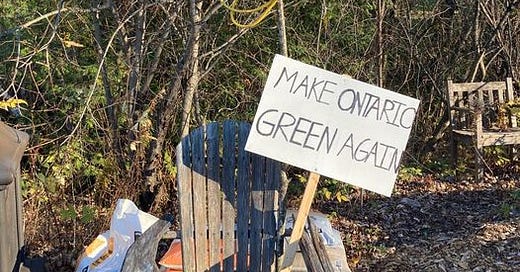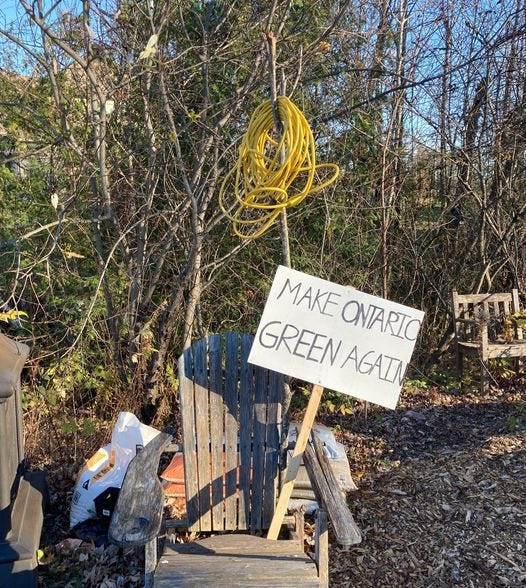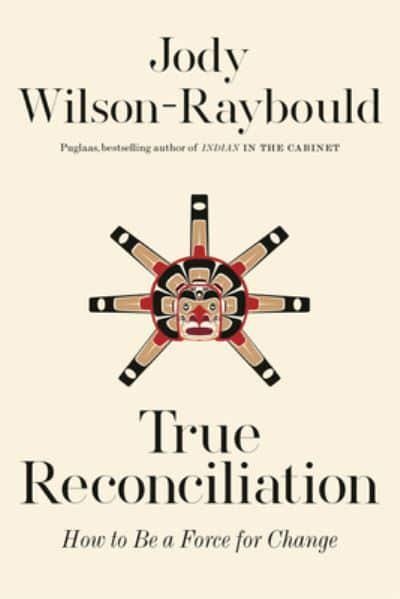Enough is Enough: God is Calling us to Climate Action
I have been in the thick of following COP27 for the past week; I preached on COP27 yesterday in North Gower and Carsonby United Churches. The bottom line is this: there are many true leaders of the climate movement at COP27: Indigenous leaders, youth delegates, climate scientists, and environmental organizations. There are leaders from the global South, who are witnessing to the devastating effects of climate change in their countries, and calling for loss and damage compensation from rich countries (who have been the highest emitters of fossil fuels globally) to poor countries (who have typically been the lowest emitters, yet the hardest hit with the consequences) to cover the costs incurred to date from climate-related weather events.
Yet, there are many more delegates, with much more power and voice, from the world’s top-emitting countries, and a disturbing number of representatives of the oil and gas industry. 636 fossil fuel lobbyists were granted access to COP27 this year; a larger delegation than any country, except the UAE, and twice as many delegates than from the official UN constituency for Indigenous people. Fossil fuel lobbyists have the expressed intention of continuing gas and oil extraction; this completely contradicts what the IPCC has said is needed, if we are to manage to limit global warming to 1.5°C by 2030, and achieve net zero emissions by 2050.
Enough is enough. I was led by the Holy Spirit to preach a call to action in yesterday’s sermon. God is calling us to climate action. The world is on a clear and speedy trajectory to at least 2.8°C warming, which will spell utter catastrophe for the world. (By contrast, the extreme weather events that we are seeing now, causing more intense hurricanes, forest fires, flooding, and droughts, is due to only 1.18°C warming).
Enough is enough. I am feeling led to the streets, to protest the unwillingness for the Canadian government, and governments around the world, to call a moratorium on oil and gas expansion, and to insist that the government put effective measures in place to curb emissions. I am feeling led to write letters, and to support others in taking climate action, too. I am feeling led to a discipleship of climate action. This is how I am called to live my faith out in action.
Although I was a bit of an activist in my 20s, in my 30s and 40s I was busy with my education and raising my family. Now that I am 50, and the world is burning and flooding, I no longer have the ‘luxury’ of letting others act on my behalf. We need everyone involved. It is time. Time to get out on the streets, to write more letters, as well as take more personal measures to reduce our carbon footprint. Time to discern how we can use our gifts and abilities, and the power and privilege of our social locations, to work toward change.
I am not, by nature, an organizer. But I do know how to reach out to those who are. I have discovered Fridays for Future Ottawa (https://www.fridaysforfutureottawa.org/), and a few climate activists within the United Church in Ottawa. I am joining them, and taking their lead. I know that wherever you are, there are activists already involved in the fight for climate change; they can help you get started.
Will you join me? If you feel so called, but aren’t sure what to do, email me at: jessica@jessicahetherington.ca, and I will help you get started.
Announcements
If you are in the Ottawa area, please join me with others at The Extension Cord Protest ~ La Manif des Rallonges on Saturday, November 19 from 1:00-2:30 pm at Booth St. and Ottawa River Parkway. This is what the event on Facebook (https://www.facebook.com/events/booth-st-and-the-ottawa-river-pathway/the-extension-cord-protest-la-manif-des-rallonges/1258350074946295/) says:
“Our provincial government is trying to burn more and more gas to power the province but is ignoring the idea of importing clean power from Quebec. This is completely unacceptable during a climate crisis. So, enter The Electrical Cord Protest! We'll link Ontario and Quebec as we demonstrate and involve our community.
~ Notre gouvernement provincial essaie de brûler de plus en plus de gaz pour alimenter la province, mais ignore l'idée d'importer de l'énergie propre du Québec. C'est totalement inacceptable en période de crise climatique. Alors, voilà La Manif des Rallonges! Nous établirons un lien entre l'Ontario et le Québec au fur et à mesure que nous protestons et impliquerons notre communauté.
There will be warm beverage and food.“
If you can, bring an extension cord on a pole, or a sign. I hope to see you there!
BLOG POST: Religious Diversity in the Earth Community
Find it here: https://jessicahetherington.ca/blog/
Reading for Transformation
Turning to Earth: Stories of Ecological Conversion by F. Marina Schauffler. Charlottesville: University of Virginia Press, 2003.
How do we become transformed in our experiences of and relationship with the wider natural world? This book explores that question, examining the nature and dynamics of ecological conversion; the experience of being transformed toward profound connection with the natural world and how it manifests. Schauffler explores the writings of such people as Rachel Carson, Alice Walker, Terry Tempest Williams, and others, to explore what ecological conversion was like for each of them, and what we can learn about the relationship between a transformation toward the Earth community, and efforts to care for it. This book was and continues to very helpful in my research.
True Reconciliation: How to Be a Force for Change by Jody Wilson-Raybould. Toronto: McClelland and Stewart, 2022.
My mother drew my attention to this book, after hearing an interview with the author. Published earlier this month, former Canadian Minister of Parliament and member of the We Wai Kai First Nation offers this book as an answer to the question she has been asked by many: “What can I do to help advance reconciliation?” She offers practices in three categories: Learn, Understand and Act. Earth healing, in Canada and around the world, cannot happen without reconciliation with Indigenous communities, and Indigenous leadership at the forefront of ecological change.
If you have read or are planning to read either of these books, please let me know! I would love to hear your reflections. Email them to me at: jessica@jessicahetherington.ca.
Discipleship in Action
Give Up Your Car
If you own a car, could you give it up? Do you live in a place where public transit is a viable option? What about a bicycle, either electric or pedal? Walking, uber, or carsharing (such as Comunauto)? Does your health make it possible? I am aware that for some readers, the idea of giving up your car (if you own one) is infeasible for numerous reasons. So, this idea of "discipleship in action" is for those of us who can give this some serious consideration.
Now that I am working primarily from home, my husband and I have been talking about giving up our second car. We were a one-vehicle family for about 8 years before we purchased it, so we have done this before. But we are the first to admit how convenient having two cars is now, especially with him working outside the house most days during the week, and the ups and downs of our weather, and the spotty transit that is OC Transpo.
But does convenience = need? Therein lies the rub for us. Can we coordinate our schedules so that when one of us could really use a car, say to buy groceries, that we use the primary vehicle? Can we get a membership with Communauto, such as I had before I met my spouse? Can I become more comfortable on my bike in the warmer months, and to the slower pace of travel on public transit?
I am planning an experiment, especially now that we are heading into the winter months. I am going to pretend that we have already sold the second car, and try to plan out my days and trips outside the house to either walk, bike or ride the bus. If I really need a car, such as for groceries or longer drives, then I will try to schedule it for when the primary car is available. I am going to try to be accountable to myself and my husband in this experiment, and be honest about when I really need the car, versus when it would have simply been more convenient. My prayer is that, not only do I discover that I need it far less than I realized, but that the discipline of using alternative modes of transportation serves as a spiritual practice, filling my spirit with a sense of connection with and faithfulness to God in my discipleship.
What about you? Have you given up a vehicle for the sake of the planet? Is this something you are able or willing to try? Let me know.









